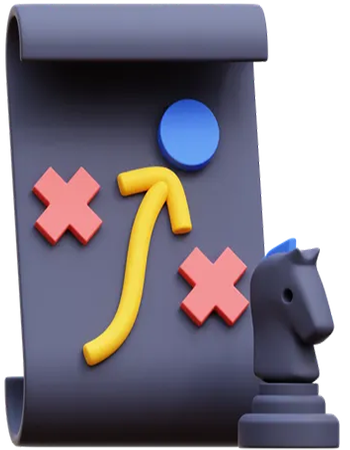The Ultimate Guide To Betting Strategies
Ready to take your casino game to the next level? We've crafted The Ultimate Guide to Betting Strategies just for you! Whether you're a seasoned player or just starting, our guide offers invaluable insights into how to approach your favorite casino games with smart, calculated bets. Learn about popular betting strategies like Martingale, Fibonacci, and Paroli, and discover which strategy works best for you. Whether you're spinning the wheel at roulette, trying your luck at blackjack, or wagering on the slots, the right betting strategy can make a huge difference. Dive in today and master the art of smart betting. Maximize your chances of winning and boost your gaming experience with expert tips from Top Casino Games!

The Ultimate Guide To Betting Strategies
Betting, whether it's on sports, casino games, or even financial markets, has been a pastime enjoyed by millions of people around the world. While some view betting as simply a game of luck, others approach it with a more analytical and strategic mindset. The truth lies somewhere in between while luck certainly plays a role, a well-thought-out betting strategy can significantly enhance your chances of success. That's where this Ultimate Guide to Betting Strategies comes in, aimed at helping both beginners and seasoned bettors develop more effective, informed approaches to their wagers.

Betting strategies aren't about guarantees—no strategy can eliminate risk—but they are about maximizing your potential for profitable outcomes over the long term. Whether you're placing a wager on the next big football game, engaging in online casino games, or trying your luck at the horse races, understanding how to approach your bets with a clear strategy can make all the difference.
What Is a Betting Strategy? A betting strategy is a plan or method you employ to make decisions about where and how much to bet. It involves evaluating the risks and rewards associated with different betting opportunities and managing your bankroll effectively. Successful bettors don't just rely on gut feelings or emotional impulses. Instead, they base their wagers on research, analysis, and a systematic approach that gives them an edge over the randomness of the games or events.
A well-defined betting strategy not only helps you make better decisions but also ensures that you're gambling responsibly. A significant part of the strategy revolves around risk management—knowing when to bet, how much to bet, and when to walk away. This can prevent you from falling into the trap of chasing losses or letting the highs of winning drive you to make rash decisions.
The Different Types of Betting Strategies
There are many different types of betting strategies tailored to specific forms of betting. Let's take a look at a few of the most popular approaches:
- Value Betting: This strategy involves identifying bets where the odds are in your favor, meaning you believe the probability of an event happening is higher than the odds suggest. In essence, you're looking for “value” in the bet, which may often be missed by casual bettors.
- Bankroll Management: One of the most crucial aspects of any betting strategy is proper bankroll management. This strategy dictates how much of your total funds you should bet on each wager. A common rule is the 1-2% rule, where you wager only a small portion of your bankroll on each bet, thus minimizing risk while still giving yourself the chance to grow your funds.
- Martingale System: A popular yet risky strategy, the Martingale involves doubling your bet after every loss. The idea is that eventually, you'll win, and that win will recover all your previous losses plus a small profit. While it can work in some cases, it's a dangerous strategy, as it requires a large bankroll and can lead to substantial losses.
- Fibonacci Strategy: Based on the famous Fibonacci sequence, this strategy increases your bet size following a loss in a calculated way. It's more gradual than the Martingale and aims to recoup losses while minimizing risk, but it also comes with its own set of challenges.
- The Kelly Criterion: This mathematical formula helps you determine how much of your bankroll to wager on a given bet. It's designed to maximize growth while minimizing the risk of ruin. While more complex, this strategy is favored by many professional bettors due to its disciplined and scientific approach.
Why Strategy Is Essential for Betting

While luck is certainly a factor in betting, strategy is essential for long-term success. Without a strategy, you risk relying on pure chance, which often leads to unpredictable outcomes and can cause financial strain. A good betting strategy helps you navigate the highs and lows of betting and ultimately puts you in a better position to come out ahead in the long run.
By employing a structured approach to your bets, you'll also be able to maintain control over your emotions and avoid impulsive decisions, which are often the downfall of bettors. Whether you're betting on sports or playing casino games, a well-thought-out strategy keeps you grounded and ensures that your betting activities remain fun and responsible.
In the following sections of this guide, we'll delve deeper into various strategies, provide tips for implementing them effectively, and discuss key principles like risk management, research, and self-discipline—all of which play an important role in shaping a winning approach. Whether you're new to betting or looking to refine your current strategies, this guide will give you the tools to make smarter decisions and increase your chances of success. Let's get started!

What Are Online Casino Betting Strategies?
In the world of online casinos, betting strategies play a significant role in how players approach their gameplay. Unlike traditional forms of gambling where the outcome may be entirely based on luck, online casino betting strategies are designed to help players manage their bets more effectively, make informed decisions, and, in some cases, increase their chances of winning. While no strategy can guarantee success due to the inherent randomness of most online casino games, having a plan in place can help players stay more disciplined, control their bankroll, and enhance their overall gaming experience.

At its core, an online casino betting strategy refers to a set of principles or methods that players use to guide their betting behavior. These strategies aim to minimize risk, maximize the potential for winning, and most importantly, maintain a sustainable approach to gambling. For many, the ultimate goal is to increase the likelihood of making a profit over time, or at the very least, to minimize losses and extend their playing time.
One of the fundamental aspects of any successful online casino betting strategy is understanding the nature of the games you're playing. Unlike land-based casinos, online casinos use random number generators (RNGs) to determine the outcomes of games like slots, poker, blackjack, and roulette. These RNGs ensure that each spin, deal, or roll is entirely independent of the previous one. As a result, players must acknowledge that the element of chance is always present, and no strategy can influence the outcome of these games directly. However, by understanding the game rules, odds, and house edge, players can adopt approaches that help them make better-informed betting decisions.
A key element of online casino betting strategies is bankroll management. This aspect is often overlooked by casual players, but it's essential for anyone looking to play responsibly and potentially profit from their betting activities. A good strategy includes setting a budget for your gaming session and sticking to it. This prevents players from overspending and helps them control their finances. It's important to understand that no matter how well you plan, there will be wins and losses in any betting session. The idea behind bankroll management is to ensure you don't lose more than you can afford to and that you're able to enjoy your gaming experience without financial strain.
Another significant component of an online casino betting strategy is game selection. Not all online casino games offer the same odds or opportunities for profit. For instance, table games like blackjack, baccarat, and poker are generally more favorable to players than games of pure chance like slots or roulette, as these games involve elements of skill and decision-making. In contrast, slots are often designed to offer bigger payouts, but they come with higher volatility, meaning players may experience long periods of losing before hitting a win. By understanding the odds of the games you're playing, you can make more informed choices and tailor your strategy to the game's specific dynamics.
Timing and session length also play a crucial role in effective betting strategies. Players often find that their performance can vary based on how long they play. Prolonged sessions can lead to fatigue, which can impair decision-making and increase the likelihood of making impulsive or emotional bets. By setting time limits for each session, players can maintain a clear mind and avoid the risks of “chasing losses” or becoming overly confident after a win. In addition, setting milestones, such as a win goal or loss limit, can help players walk away at the right time.
One of the most critical yet often ignored aspects of any online casino betting strategy is psychological discipline. The mental aspect of gambling is just as important as the financial and strategic elements. Understanding the emotional swings that come with both wins and losses can prevent you from falling into destructive gambling habits. It's important to remain calm and collected, regardless of the outcome of your bets. A well-disciplined player is able to accept losses without trying to immediately recover them with larger bets or more risky plays, and likewise, a disciplined player will avoid becoming overconfident after a win.
Lastly, understanding the house edge is crucial for any online casino strategy. The house edge refers to the mathematical advantage that the casino has over the player in any given game. Every game has a built-in house edge, and while this doesn't guarantee a loss for the player, it does mean that the odds are tilted in favor of the casino over the long term. Some games have a lower house edge, meaning they offer better chances for the player to win over time. For instance, blackjack and certain types of video poker tend to have lower house edges compared to slots or roulette.
Online casino betting strategies are about more than just the tactics you use to place your bets. They encompass a well-rounded approach to managing your bankroll, selecting games wisely, understanding the odds, and maintaining psychological discipline. While these strategies can't eliminate the role of luck, they can certainly improve your decision-making process and help you enjoy a more controlled, responsible, and potentially profitable online casino experience.
Are Online Casino Betting Strategies Legal?

When it comes to online casinos, one of the most common questions players often ask is whether using betting strategies is legal. This query stems from a misunderstanding about the role of strategies in gambling and how they interact with the rules of the game and the laws governing online casinos. In short, yes, online casino betting strategies are legal, and players can certainly use them to inform their betting decisions. However, there are some important nuances to consider that revolve around the specific games, the nature of strategies, and the jurisdiction in which the player is located.
Understanding the Role of Betting Strategies
Before diving into the legality of betting strategies, it's crucial to understand what they actually entail. Betting strategies are essentially methods or systems that players use to try and enhance their odds of winning or at least manage their bets in a more structured, disciplined way. While no strategy can alter the fundamental nature of casino games that rely on chance, such as slots or roulette, certain games like poker or blackjack involve skill and decision-making. In these cases, strategies can help a player make more informed choices.
It's important to differentiate between games of chance and games of skill. In games like slots, baccarat, or roulette, the outcome is completely random, determined by a Random Number Generator (RNG). In these cases, betting strategies cannot influence the result of a spin, roll, or deal. However, in games like blackjack, poker, or craps, where skill and decision-making play a larger role, strategies can help players make more calculated decisions to minimize the house edge.
Legal Considerations for Betting Strategies
Now, when it comes to the legality of betting strategies, the general rule is that they are perfectly legal. Using a strategy is akin to planning and decision-making in any other form of betting. For example, a player using a bankroll management system or a progressive betting strategy like the Martingale system is still operating within the bounds of the law. These strategies are designed to help players manage their risks, make better betting choices, and potentially maximize their long-term chances of success.
That said, while using strategies is legal, the rules of individual casinos may differ when it comes to how certain strategies are implemented. For example, some online casinos may have restrictions on certain types of progressive betting systems in particular games. This is especially true in games like blackjack, where card counting, a strategy that involves tracking the deck, is frowned upon and can lead to a player being banned from the casino. However, card counting is a strategy that requires physical presence and interaction with the deck, which is not possible in most online casinos, where card shuffling is automated.
Online Casino Regulations and Fair Play
In most jurisdictions, online casinos are regulated by specific gaming authorities that ensure fair play and protect players. The use of betting strategies in itself is not an issue in these regulatory environments, as they are designed to allow players to play fairly and responsibly. As long as players are not engaging in fraudulent activity, such as collusion or exploiting software bugs, the use of strategies is seen as a legitimate part of the betting experience.
For instance, online casinos that hold licenses from reputable authorities like the UK Gambling Commission or the Malta Gaming Authority are required to provide fair and transparent games, and they monitor for any signs of unfair advantage being gained through strategies that involve manipulation of the game software. But as long as a strategy doesn't involve cheating or violating the casino's terms and conditions, players can use them without legal concerns.
Restrictions on Certain Strategies
Although strategies are generally legal, certain types of strategies may be restricted or penalized depending on the online casino's rules and the game being played. For example, bonus abuse strategies, where players attempt to manipulate bonuses or promotions to get more favourable outcomes than intended, are often explicitly banned in the terms and conditions of many online casinos. Additionally, strategies that rely on using multiple accounts or collusion with other players, such as in poker, can lead to account suspensions or even legal action.
Another example is using automated tools or software to enhance a player's betting ability. Many online casinos have anti-bot systems in place to detect such actions, and players caught using these tools can face penalties. This is not considered a legitimate betting strategy and is illegal in most regulated online casino environments.
Responsible Gaming and Ethical Use of Strategies
Ultimately, the legality of using online casino betting strategies comes down to ethical and responsible gaming. While players can use strategies to help them approach betting in a disciplined manner, it's essential to remain mindful of the risks involved. The best strategies are those that promote responsible gambling and bankroll management, ensuring players can enjoy their gaming experience while minimizing the chances of losing more than they can afford.
Online casino betting strategies are legal, and players are free to use them within the boundaries of casino rules and regulations. These strategies can help players make more informed decisions and improve their gaming experience. However, players must be aware of the restrictions on certain strategies, avoid exploiting loopholes, and always adhere to the casino's terms and conditions. With this approach, strategies can be a valuable tool for any player looking to optimize their time and money spent at online casinos.
The Best Online Casino Betting Strategies
When it comes to playing at online casinos, many players look for strategies to help maximize their chances of success. While it's important to remember that most casino games, especially slots and roulette, rely on randomness and luck, there are still ways to improve your gaming experience and potentially reduce the house edge in certain games. Here, we'll discuss some of the best online casino betting strategies that players often turn to.

Bankroll Management is perhaps the most crucial strategy to follow. This involves setting a budget for your gaming session and sticking to it. It helps you avoid overspending and ensures that you can enjoy playing responsibly. By managing your bankroll wisely, you can prolong your gaming sessions, making the most of your budget and keeping the fun in the game.
Progressive Betting Systems, such as the Martingale or Paroli systems, are popular among players. These strategies involve adjusting your bets based on wins or losses. The Martingale system, for example, suggests doubling your bet after a loss to recoup losses, while the Paroli system increases bets after a win. While these strategies can be thrilling, they come with risks, especially in games with high volatility.
For games like blackjack, card counting is a well-known technique, although it's typically not feasible in online casinos due to automated shuffling systems. Still, understanding the odds and using a basic strategy to minimize the house edge is a valuable approach. The best online casino betting strategies involve a combination of proper game selection, disciplined betting, and responsible bankroll management. While strategies can help, it's essential to remember that luck still plays a significant role in most games.
The Casino Betting Strategy Kelly Criterion
The Kelly Criterion is a popular mathematical formula used by gamblers and investors alike to optimize the size of their bets, maximizing long-term growth while minimizing the risk of going broke. Although often associated with financial markets, this strategy is also widely applicable to gambling, particularly in casino games where players have some control over the odds or game selection. The Kelly Criterion aims to balance risk and reward, helping players maximize profits without risking too much of their bankroll on any single bet.
The Basics of the Kelly Criterion
The Kelly Criterion determines the optimal bet size as a proportion of your total bankroll, based on the edge (expected value) you have over the house or other players and the odds being offered. The formula is:f∗=bp−qbf^* = \frac{bp – q}{b}f∗=bbp−q
Where:
- f∗f^*f∗ is the fraction of your bankroll to bet.
- bbb is the odds received on the bet (net odds, i.e., odds minus 1).
- ppp is the probability of winning (as a decimal).
- qqq is the probability of losing, which is 1−p1 – p1−p.
In essence, the Kelly Criterion helps you determine how much of your bankroll to risk in order to maximize the rate of return while minimizing the chance of losing your entire bankroll. The key idea is to bet more when you have a higher probability of winning and a better payout, but to bet less when your edge is smaller or the odds are less favorable.
Example of How to Use the Kelly Criterion
Suppose you're playing blackjack, and after studying the odds, you believe that you have a 55% chance of winning (p = 0.55) against the casino, and the house is offering even money (1:1 odds). In this case, your b=1b = 1b=1, p=0.55p = 0.55p=0.55, and q=1−0.55=0.45q = 1 – 0.55 = 0.45q=1−0.55=0.45.
Using the Kelly formula:f∗=(1)(0.55)−0.451=0.10f^* = \frac{(1)(0.55) – 0.45}{1} = 0.10f∗=1(1)(0.55)−0.45=0.10
This means that, according to the Kelly Criterion, you should bet 10% of your bankroll on this hand. By following the Kelly Criterion, you can manage your bankroll effectively, reducing the risk of losing everything while ensuring that you're making the most of favourable situations.
Advantages of the Kelly Criterion
The main advantage of the Kelly Criterion is its focus on maximizing growth over the long term. By betting a proportionate amount of your bankroll based on your edge, you allow for compounding growth, which can significantly increase your bankroll over time. It also minimizes the risk of ruin, since the formula inherently limits the amount you bet when your edge is smaller, reducing the chances of losing your entire bankroll.
Which Casino Games Is This Strategy Good For?
The Kelly Criterion is most effective in games where you have a measurable edge or the ability to influence the outcome based on skill, knowledge, or information. Here are some examples of casino games where the Kelly Criterion can be used effectively:
- Blackjack: Blackjack is one of the best games for applying the Kelly Criterion because, unlike games like slots or roulette, players can influence the odds through strategy, card counting, and other techniques. If you can estimate your advantage based on the deck composition, the Kelly Criterion helps you determine how much to bet.
- Poker: In poker, you're often competing against other players, not the house, which means you have more control over the outcome. The Kelly Criterion works well when you can assess your expected value (EV) in a particular hand or situation, helping you determine how much to wager based on your edge against other players.
- Sports Betting: Though not a casino game, sports betting is another popular application of the Kelly Criterion. Here, you have the ability to estimate the odds and probability of an outcome based on your analysis of the game, which allows you to bet more strategically.
The Kelly Criterion is less effective in games like slots, roulette, and baccarat. These games are based largely on luck, and the house edge remains constant and unaffected by strategy. Since the Kelly Criterion relies on the ability to estimate your edge, it doesn't provide much benefit in games where the outcome is random and completely controlled by chance.
Limitations of the Kelly Criterion
While the Kelly Criterion is a powerful strategy, it's not perfect. One limitation is that it requires you to accurately assess your edge or probability of winning. If your estimates are wrong, you could end up betting too much and losing your bankroll. Additionally, Kelly betting can sometimes suggest large bets, particularly in high-advantage situations, which can be uncomfortable or impractical for some players. To mitigate this, many players opt for a fractional Kelly, betting only a portion of the amount the formula suggests (e.g., half-Kelly) to reduce risk and volatility.
The Kelly Criterion is a sophisticated and mathematically sound betting strategy that can be highly effective in certain casino games, especially those where skill or strategy plays a role. It helps players maximize their growth over time while managing risk, making it an excellent tool for disciplined gamblers looking to optimize their betting behaviour.
The Casino Betting Strategy The Martingale
The Martingale strategy is one of the most famous and widely used betting systems in both casinos and other forms of gambling. It's a progressive betting system designed to help players recover losses by doubling their bets after each loss. The core principle of the Martingale system is simple: after losing a bet, you increase your next bet by the same amount as the previous bet, to eventually win and recoup all previous losses, plus a small profit.
The Basics of the Martingale Strategy
The Martingale system works on the assumption that, eventually, you will win a bet. Once you win, the strategy resets, and you begin betting the original amount again. The idea is that after a win, you'll recover all of your previous losses and make a small profit equal to your original bet.
The fundamental concept behind this strategy is that you are guaranteed to win eventually if you have an unlimited bankroll and no betting limits. By continuously doubling your bet after each loss, you'll win back all your previous losses when you finally win. However, in practice, this strategy can be risky and potentially devastating without a large bankroll or sufficient betting limits at the casino.
How to Use the Martingale Strategy: Example
Let's look at a practical example to understand how the Martingale strategy works:
- Starting Bet: You begin by betting $10 on a game with near 50/50 odds, such as blackjack, roulette, or baccarat.
- First Loss: If you lose the first bet, you double your next bet to $20. Your cumulative loss is now $10.
- Second Loss: If you lose again, you double your bet again to $40. Now, your cumulative loss is $30 ($10 + $20).
- Third Loss: If you lose again, you double your bet to $80. At this point, your cumulative loss is $70 ($10 + $20 + $40).
- Winning Bet: If you win the next bet of $80, you will have recovered all your previous losses ($10 + $20 + $40) and made a small profit of $10, which is equal to your original bet.
At this point, you reset and start again with your initial $10 bet.
Risks and Challenges of the Martingale System
While the Martingale system might sound like a foolproof way to win back losses, it has some major drawbacks:
- Casino Limits: Many casinos impose betting limits, which means you cannot keep doubling indefinitely. Once you hit the table's maximum bet limit, you could find yourself stuck in a cycle of losses that you can no longer recover from.
- Bankroll Requirements: The Martingale system assumes you have an unlimited bankroll, but in reality, even a moderately sized bankroll can be depleted very quickly after just a few consecutive losses. The amount of money required to keep doubling your bets can escalate quickly and be overwhelming.
- High Volatility: While the Martingale strategy can offer the potential for a quick win, it also comes with high volatility. If you experience a long losing streak, you may end up betting large amounts of money, leading to significant losses. This makes it a risky strategy, especially for players with a smaller bankroll.
Which Casino Games Is the Martingale Strategy Good For?
The Martingale system is best suited for games with even-money bets or bets that offer close to 50/50 odds. Some of the most common games where the Martingale strategy is used include:
- Roulette: In roulette, players often use the Martingale system on bets like red/black, odd/even, or high/low, which offer nearly 50% odds of winning. If you lose, you can double your bet until you eventually win, but keep in mind the potential for reaching the table's betting limits.
- Blackjack: Although blackjack involves more skill than games like roulette, players can still apply the Martingale system to even-money bets, such as betting on a win or a tie. However, because blackjack also has a house edge and is influenced by factors like card counting and dealer shuffling, this strategy can be harder to use effectively.
- Baccarat: In baccarat, the Martingale system is often applied to the Player or Banker bets, both of which have close to even odds (with a slight house edge). This makes baccarat one of the more popular games for Martingale players, as the system aligns well with the game's simple bet structure.
While the Martingale strategy works best with games involving 50/50 odds, it's essential to remember that it's not a foolproof method. The risk of experiencing long losing streaks and hitting table limits or running out of funds can be substantial. Thus, while the Martingale strategy can offer some short-term gains, it is crucial for players to use it with caution and understand the risks involved.
The Martingale strategy is an easy-to-understand betting system that can be applied to certain casino games with even-money bets. However, it comes with significant risks, particularly if you face a prolonged losing streak or if the casino enforces betting limits. Always be aware of the potential drawbacks and consider the long-term implications of using this strategy in your casino gameplay.
The Casino Betting Strategy The Fibonacci System
The Fibonacci betting system is a progressive betting strategy that draws its name from the famous mathematical sequence, the Fibonacci sequence. In gambling, it is a more conservative alternative to other progressive systems like the Martingale. While it doesn't aim to recover losses as quickly as the Martingale system, the Fibonacci system still follows the principle of increasing bets after a loss. However, it does so in a much more gradual and less aggressive manner.
The Basics of the Fibonacci Betting System
The Fibonacci sequence is a series of numbers in which each number is the sum of the two preceding ones. The sequence begins like this: 0, 1, 1, 2, 3, 5, 8, 13, 21, 34, and so on. In the context of gambling, the Fibonacci sequence is applied to bet sizing. After a loss, the bettor increases their bet according to the next number in the sequence. After a win, the bettor moves back two steps in the sequence.
The idea behind the Fibonacci system is that by betting more modest amounts in comparison to other progressive betting systems, you can recover from losses without risking a large portion of your bankroll. Unlike the Martingale system, which requires players to double their bets after each loss, the Fibonacci system increases the bet more slowly, following the sequence.
How to Use the Fibonacci Betting System: Example
Let's take a look at how the Fibonacci system works in practice:
- Initial Bet: You start with a small base bet, say $1.
- First Loss: After your first loss, you increase your bet to $1 (the next number in the sequence).
- Second Loss: You lose again, so your next bet is $2 (the sum of the previous two bets).
- Third Loss: You lose again, so you bet $3 (again, the sum of the previous two bets).
- Fourth Loss: Your bet increases to $5.
- Win: If you win, you return to the previous two steps in the sequence. For example, if you won after betting $5, your next bet would be $3 (the number two steps back in the sequence).
After a win, the sequence effectively “resets,” but you continue following the progression after each loss.
Advantages of the Fibonacci Betting System
- Lower Risk than Martingale: The Fibonacci system is less aggressive than the Martingale strategy. Since you don't have to double your bets after every loss, the risk of exhausting your bankroll in a short period is much lower. It's a more conservative approach to progressive betting.
- Gradual Recovery: Because the bet increases more gradually than with Martingale, your betting increases are more manageable, making it easier to withstand a string of losses without betting enormous amounts.
Disadvantages of the Fibonacci Betting System
- Still Progressive: While the Fibonacci system is more moderate than Martingale, it's still a progressive system, meaning that you can end up betting large amounts if you experience a series of losses. This can still put pressure on your bankroll.
- Not a Guaranteed Win: Like all betting strategies, the Fibonacci system doesn't guarantee that you will win in the long run. It only helps with managing bet sizes and minimizing losses, but the house edge still applies.
Which Casino Games Is the Fibonacci Betting System Good For?
The Fibonacci system is best suited for casino games that offer even-money bets or bets with close to 50/50 odds. This includes:
- Roulette: The Fibonacci system can be applied to bets like red/black, odd/even, or high/low in roulette, which are almost 50/50 bets. These bets offer a higher likelihood of winning compared to other types of bets on the roulette table.
- Baccarat: Similar to roulette, baccarat offers bets on the Player or Banker, both of which have odds close to 50%. The Fibonacci system works well here because the betting progression is gradual, giving players a better chance of recovering from losses.
- Blackjack: In blackjack, while you can apply the Fibonacci system to even-money bets (such as betting on a win or tie), the house edge is more complex due to the role of skill and card counting. However, it can still be used in low-risk situations where even money bets are placed.
The Fibonacci betting system is a progressive betting strategy that offers a more conservative approach compared to systems like Martingale. By following a slow progression based on the Fibonacci sequence, players can minimize risks and recover from losses more gradually. It works best in games with even-money or near-50/50 odds, such as roulette, baccarat, or certain bets in blackjack. However, as with any betting strategy, it does not eliminate the house edge, and it's essential to be aware of its limitations. While it can help manage your bankroll and reduce the intensity of loss recovery, there are no guarantees in gambling.
The Casino Betting Strategy Card Counting
Card counting is a well-known strategy primarily used in blackjack. It involves keeping track of the cards that have been dealt from the deck to gain a statistical advantage over the casino. By knowing the composition of the remaining cards, players can adjust their bets and playing decisions to increase their chances of winning. While not illegal, card counting is highly discouraged by casinos, and players caught using the technique may be asked to leave or banned from playing. However, when executed properly, it can shift the odds in favor of the player, making it one of the most effective strategies in casino gaming.
The Basics of Card Counting
Card counting is based on the idea that certain cards in a deck are more favorable to the player than others. In blackjack, high cards (10, Jack, Queen, King, Ace) are advantageous to the player because they increase the chances of getting a strong hand, while low cards (2 through 6) benefit the dealer.
The most common card-counting system is the Hi-Lo System, which assigns values to the cards:
- Low cards (2-6): +1
- Neutral cards (7-9): 0
- High cards (10, Jack, Queen, King, Ace): -1
The player keeps a “running count” by adding or subtracting these values as cards are dealt. A positive count indicates that more high cards remain in the deck, which is favorable to the player, and a negative count suggests that the remaining cards are mostly low cards, which is better for the dealer. By increasing bets when the count is positive, players can take advantage of favorable conditions.
How to Use Card Counting: Example
Let's walk through a simple example to understand how the Hi-Lo system works:
- Starting with a Running Count of 0: Imagine you're playing blackjack with a fresh deck of cards, and you begin with a running count of 0.
- Cards are Dealt: The first three cards dealt are a 2, 7, and King. Using the Hi-Lo system:
- 2 is a low card, so you add +1 to your running count.
- 7 is neutral, so the count stays the same.
- King is a high card, so you subtract -1 from the count.
- Adjusting Bets: Based on the running count, you adjust your bet. In this case, since the count is positive, the deck has more high cards left, giving you a better chance of winning. You may increase your bet to take advantage of this favorable situation.
- Continue Counting: As more cards are dealt, you keep adjusting the running count. If the count becomes more positive, you continue increasing your bets. If it becomes negative, you decrease your bets or continue playing at a lower stake.
Casino Games Where Card Counting is Useful
Card counting is primarily effective in blackjack, as it directly impacts the probabilities of drawing favorable hands. It's especially useful in games with fewer decks (single or double deck), as it's easier to track the cards in smaller decks compared to multi-deck games.
- Blackjack: The best casino game for card counting, as the strategy can significantly tilt the odds in favor of the player. In blackjack, the distribution of high and low cards directly affects the likelihood of getting a natural 21 (blackjack) or busting. Counting cards helps you know when the deck is rich in tens and aces, which increases the chances of winning.
While card counting can technically be applied to other games like Baccarat or Poker, it's far less effective because these games are less influenced by the specific cards remaining in the deck. Baccarat, for example, is a game of chance where the player's decisions don't have a significant impact on the outcome.
Challenges of Card Counting
Although card counting is a legitimate technique, casinos use several methods to counter it:
- Shuffling the Deck More Often: Many casinos use automatic shuffling machines or shuffle the deck after every few hands to disrupt card counters.
- Multiple Decks: In modern casinos, multiple deck blackjack is common, which makes it harder to track cards accurately.
- Surveillance and Behavior Monitoring: Casinos are keenly aware of card counters. Players who frequently vary their bets or exhibit suspicious behaviour may be flagged and asked to leave.
Card counting is a sophisticated strategy that allows blackjack players to gain an advantage by tracking the cards dealt and adjusting bets based on the favourable composition of the deck. While it's not illegal, it's often met with hostility by casinos, and they take steps to prevent players from using it effectively. Still, for skilled players, card counting can offer a significant edge in games like blackjack, where the outcome is heavily influenced by the remaining cards. Understanding the risks and challenges, as well as the techniques involved, is crucial if you intend to use card counting in a casino setting.
The Casino Betting Strategy Arbitrage Betting
Arbitrage betting, often referred to as “arbing”, is a strategy that takes advantage of differing odds offered by multiple bookmakers or casinos to guarantee a profit, regardless of the outcome of the event or game. It's a popular betting strategy in sports betting but can also be applied in casino gaming, although its effectiveness in the latter is limited. The fundamental concept behind arbitrage betting is to place multiple bets on all possible outcomes of an event or game in such a way that no matter the result, the bettor ends up with a profit.
The Basics of Arbitrage Betting
Arbitrage betting works by identifying discrepancies in odds between different bookmakers or casino platforms. Since odds are determined by the bookmakers, sometimes they will offer different odds for the same event or game, either because of varying data inputs or as a way to attract bets. By placing carefully calculated bets on all outcomes of a game, you can ensure a guaranteed profit. For instance, if one bookmaker offers higher odds on Team A winning and another offers better odds on Team B winning, you can place bets on both outcomes in such a way that no matter the result, your total returns exceed your total stakes.
The key to arbitrage betting is calculating the stakes for each outcome. You need to ensure that you stake in proportion to the odds, so your total payout covers all bets and guarantees a profit. There are online arbitrage calculators that can help with this, making it easier to determine exactly how much to bet on each outcome.
How to Use Arbitrage Betting: Example
Let's look at an example to better understand how arbitrage betting works:
Suppose you want to bet on a roulette game, and two different casinos offer different odds for a bet on red versus black:
- Casino 1 offers odds of 2.1 on red.
- Casino 2 offers odds of 2.05 on black.
You notice that these two odds represent a potential arbitrage opportunity, as you can place bets on both red and black and guarantee a profit. Now, you need to calculate how much to bet on each outcome to ensure a guaranteed profit. Using an arbitrage calculator:
- Bet on red (Casino 1): You place $100 on red at 2.1 odds.
- Bet on black (Casino 2): You place $102.44 on black at 2.05 odds.
If red wins, you get a payout of $210 from Casino 1 (2.1 x $100). If black wins, you get a payout of $210.10 from Casino 2 (2.05 x $102.44). Either way, you'll end up with a small profit of approximately $0.10.
While this example demonstrates how arbitrage betting works, keep in mind that the profit margins in actual betting situations may be higher, especially in sports betting or more significant casino games where odds discrepancies are larger.
Which Casino Games is Arbitrage Betting Good For?
Arbitrage betting is not commonly applicable to most casino games due to the way odds are structured and the house edge that casinos have. However, it can occasionally be used in:
- Sports Betting: Arbitrage betting is most commonly used in sports betting. Since multiple bookmakers offer different odds for the same event, there are more opportunities to place bets on all outcomes of a game and guarantee a profit. For example, in sports like football, basketball, or tennis, you can find differing odds for match outcomes, and you can bet on all possible results.
- Live Betting: Some casino platforms offer live betting during games like roulette, blackjack, or baccarat. Occasionally, odds can fluctuate significantly during the game, allowing savvy bettors to place bets on different outcomes as the game progresses, though this can be very difficult to time and execute effectively.
- Betting on Outcomes in Online Casino Games: Occasionally, you might find opportunities in casino games with multiple outcomes or bonuses, like video poker or slot tournaments. However, these opportunities are rare compared to sports betting.
Challenges of Arbitrage Betting in Casinos
- Casino Monitoring: Casinos are highly vigilant when it comes to arbitrage betting. If they detect that a player is consistently using this strategy, they may limit their betting options or even ban the player from the platform altogether.
- Low Margins: The profit margins in arbitrage betting are often quite low. In casino games, the house edge makes the possibility of profitable arbitrage extremely limited unless there's a significant discrepancy in odds, which is rare.
- Time Sensitivity: Arbitrage betting requires precise timing. Odds can change very quickly, especially in live betting or during high-stakes games, making it difficult to secure the same odds across multiple platforms.
Arbitrage betting is a powerful strategy in sports betting, where bettors can exploit discrepancies in odds across multiple bookmakers. In the context of casino betting, however, its application is more limited, due to the consistent house edge and the difficulty of finding significant odds discrepancies. That said, in live betting scenarios or specific high-variance casino games, players may find rare arbitrage opportunities, though the risks and challenges are higher.
The Casino Betting Strategy Double Chance
Double Chance is a betting strategy that is primarily used in sports betting, particularly in football (soccer), but it has also found its way into some casino games that involve multiple potential outcomes. This strategy is designed to increase the chances of winning by covering two of the three possible outcomes in a match. It's a safer bet that offers a higher probability of success compared to traditional single-outcome bets, though the odds and potential payouts are usually lower.
The Basics of Double Chance
In a typical football match, there are three potential outcomes:
- Team A wins
- Team B wins
- Draw
With a Double Chance bet, you are betting on two of the three outcomes to happen, rather than just one. This increases the chances of your bet winning, but, because it's considered a lower-risk bet, the odds are typically lower, meaning the potential payout is also reduced. Double Chance can be particularly useful for players who are risk-averse and prefer more consistent wins, even if it means sacrificing higher payouts. The three possible combinations of outcomes in a Double Chance bet are:
- Team A wins or a Draw (often referred to as 1X)
- Team B wins or a Draw (often referred to as X2)
- Team A wins or Team B wins (often referred to as 12)
This strategy works well for those who want to minimize the risk of losing by covering two outcomes. It's popular in sports like football, where a draw is often a common result, and bettors want to secure a win by covering both teams.
Example of Using the Double Chance Strategy
Let's consider an example to better understand how Double Chance betting works. Imagine there's a football match between Liverpool and Chelsea, and you are evaluating the potential outcomes:
- Liverpool wins (Odds: 2.00)
- Chelsea wins (Odds: 3.50)
- Draw (Odds: 3.20)
If you were to place a regular bet on Liverpool to win, you would win if Liverpool won and lose if they did not. However, with a Double Chance bet, you could bet on Liverpool to win or a draw (1X) or Chelsea to win or a draw (X2), or even Liverpool to win or Chelsea to win (12). For example, you choose to bet on Liverpool or a Draw (1X):
- If Liverpool wins, you win the bet.
- If the game ends in a draw, you still win the bet.
- If Chelsea wins, you lose the bet.
The advantage is that you now have two possible outcomes that would result in a win, but the odds for this kind of bet are lower than if you were to bet on just one outcome. Let's say the 1X Double Chance bet offers odds of 1.40. Even though the payout is smaller, the higher probability of winning makes it appealing for risk-averse bettors.
Casino Games Where Double Chance Can Be Used
The Double Chance strategy is most commonly used in sports betting, especially football. However, the concept can be adapted to casino betting in games that offer multiple possible outcomes, including:
- Roulette: While Double Chance is not officially a betting option in standard roulette, players can implement a similar strategy by covering two adjacent groups of numbers. For instance, betting on low (1-18) and even can offer similar safety to a Double Chance bet, as you cover a larger portion of the wheel. However, the payouts are lower as you're covering more numbers.
- Baccarat: In Baccarat, there are three possible outcomes: Player, Banker, or Tie. A Double Chance strategy could involve betting on Player or Banker (essentially removing the Tie as an option), which increases the chances of winning by covering two of the three possible results.
- Casino Sportsbook Bets: In some casino sportsbooks, you may find a variety of Double Chance betting options for different sports, particularly in football, but sometimes also for basketball or other events. In these cases, the strategy is applied just like it is in traditional sports betting, covering multiple potential outcomes.
- Live Casino Games: For live dealer games, like Casino War or Dragon Tiger, a similar betting strategy could involve covering more favorable outcomes or betting on either Player or Banker to win, depending on the game's rules.
Advantages and Disadvantages of Double Chance
- Advantages:
- Higher chances of winning: Since you are betting on two outcomes, your chances of winning are much higher compared to betting on just one.
- Lower risk: This makes it a good option for conservative bettors or those looking to manage risk more effectively.
- Versatility: Double Chance can be applied in a variety of betting environments, including football, basketball, and even certain casino games.
- Disadvantages:
- Lower payout: The safer bet results in lower odds, meaning you'll win less money on a successful Double Chance bet compared to single-outcome bets.
- Still reliant on uncertainty: While the chances of winning are higher, there's no guarantee, especially in unpredictable games like football.
The Double Chance strategy is an excellent choice for bettors looking to minimize risk by covering two potential outcomes in sports or casino games. While the lower payout may deter those looking for higher risks and rewards, the increased probability of winning makes it an attractive option for risk-averse players. Whether you're betting on a football match or a game like roulette or baccarat, using Double Chance can help provide a more secure betting experience.
The Casino Betting Strategy NHL Betting Strategy
The NHL Betting Strategy is a specific approach designed to maximize the chances of winning when placing bets on National Hockey League (NHL) games. Like other forms of sports betting, NHL betting requires a solid understanding of the game, teams, and betting markets. However, NHL betting strategies often focus on aspects that are unique to hockey, such as the variability of game outcomes, team matchups, and statistical analysis. This strategy is particularly attractive to fans of the sport who want to apply their knowledge to predict game results and make informed betting decisions.
The Basics of NHL Betting Strategy
NHL betting involves placing wagers on the outcome of individual games, player performances, or specific events within a game. The main bet types include moneyline bets, puck line bets, over/under totals, and prop bets. NHL betting strategies aim to increase the chances of success by analyzing various factors that influence a game's outcome. These factors include:
- Team performance: Assessing a team's current form, injuries, home/away records, and head-to-head results.
- Goaltending: The performance of a team's goalie is critical in hockey, as it can often determine the outcome of a game.
- Power play and penalty kill stats: A team's ability to capitalize on power plays and defend during penalties is another key indicator of success.
- Situational factors: Factors like fatigue, travel schedules, and playoff implications can also influence game outcomes.
- Advanced stats: Metrics like Corsi (shot attempts), Fenwick (unblocked shot attempts), and PDO (shooting and save percentages) are often used by advanced bettors to gauge team performance.
How to Use the NHL Betting Strategy: Example
To give an example of how the NHL betting strategy works, let's consider a hypothetical scenario. Imagine you want to place a bet on a Toronto Maple Leafs game against the Montreal Canadiens. You would first start by gathering key information, such as:
- Team records: Toronto has a solid home record while Montreal struggles on the road.
- Injuries: Toronto's star player is injured, but Montreal's goalie is currently on a hot streak.
- Head-to-head: Historically, Toronto has dominated Montreal in recent matchups, but their recent games have been closer than expected.
- Goaltending: Toronto's starting goalie has been inconsistent in the past few weeks, while Montreal's goalie has been performing at a high level.
Based on this information, you could apply your NHL betting strategy by betting on Montreal to cover the spread or Montreal to win on the moneyline at favorable odds. Alternatively, if you believe Toronto's goalie will improve, you may choose to bet on Toronto to win in a close game, perhaps considering the over/under for total goals in the game based on your analysis of both teams' offensive and defensive stats.
Casino Games Where NHL Betting Strategy Can Be Applied
Although the NHL Betting Strategy is primarily used for sports betting, it does share some similarities with betting strategies used in casino games that involve statistical analysis and odds assessment. While you cannot directly apply NHL betting to typical casino games like blackjack or roulette, the core principles of risk assessment and odds evaluation from NHL betting can be adapted to certain games. Here's how it relates:
- Poker: Like NHL betting, poker is all about assessing probabilities and the odds of your hand improving. Much like a hockey team's stats and performance metrics, poker players use information to assess the strength of their hand compared to their opponents.
- Blackjack: While NHL betting strategy relies heavily on team analysis and performance, in blackjack, players assess the deck composition and card-counting strategies, which, like sports stats, help in maximizing the odds of a favorable outcome.
- Sportsbook Casino Bets: In a casino sportsbook, the NHL Betting Strategy applies directly to your bets on NHL games. You can make moneyline, puck line, and over/under bets on the outcomes of NHL games using your strategy and understanding of the teams.
- Live Betting in Casino Games: Just like NHL game situations can change based on injuries, player performance, and momentum shifts, live casino betting allows you to make more informed decisions as the game progresses, similar to adjusting your bets based on the evolving state of a hockey match.
Advantages and Disadvantages of NHL Betting Strategy
- Advantages:
- Increased chances of success: By carefully analyzing team performance, stats, and other factors, bettors can make more informed decisions, increasing the likelihood of successful bets.
- Better value bets: NHL betting strategies help bettors identify underappreciated teams or favorable odds, offering better value on specific bet types.
- In-depth knowledge: Fans of hockey have a natural advantage, as their knowledge of the sport can be leveraged in making more precise betting decisions.
- Disadvantages:
- Requires extensive research: Successful NHL betting strategies require knowledge of advanced statistics, team dynamics, and game situations, which can be time-consuming to track.
- Volatility: Like all sports betting, NHL betting is not immune to unpredictable outcomes. Injuries, refereeing decisions, and other external factors can turn a well-researched bet into a loss.
- House edge: In the long run, sports betting platforms and casinos have a built-in house edge, making it difficult to maintain long-term profitability without significant research and discipline.
The NHL Betting Strategy is a powerful tool for bettors who want to apply their knowledge of hockey to make informed and calculated betting decisions. By analyzing team performance, goaltending, situational factors, and advanced statistics, bettors can improve their chances of success. While NHL betting is not directly applicable to traditional casino games, the analytical skills and risk-assessment techniques used in NHL betting can also be adapted to improve your decision-making in other forms of betting and gaming.
The Casino Betting Strategy Bankroll Management
Bankroll management is a fundamental casino betting strategy that focuses on controlling your betting funds to maximize your long-term profitability and minimize the risk of going broke. Whether you're playing slots, table games, or engaging in sports betting, having a solid bankroll management strategy is crucial to ensure a sustainable approach to gambling. This strategy is not about predicting outcomes or manipulating odds but rather about effectively managing your finances, setting limits, and adjusting your bets according to your available funds.
The Basics of Bankroll Management
At its core, bankroll management is about determining how much money you're willing to risk in a gambling session and sticking to that limit. It involves setting clear rules about how much of your bankroll you'll bet on each game, ensuring that you never wager too much and always maintain enough balance to weather losses. Key aspects of bankroll management include:
- Setting a Budget: The first step is deciding how much money you can afford to gamble. This is often referred to as your “bankroll”—the total amount you're willing to risk. The general rule is that this should be money you can afford to lose without affecting your daily life or financial stability.
- Defining Session Limits: Instead of treating your entire bankroll as one large sum, it's wise to break it down into smaller, more manageable portions. For example, if your total bankroll is $1,000, you might decide that for a single session, you'll only bet $100. This prevents you from depleting your entire bankroll in one go.
- Bet Sizing: With a set bankroll, it's important to determine how much to bet per game or hand. A common recommendation is to wager no more than 1-2% of your total bankroll on any single bet. This ensures that even after a series of losses, you'll have enough funds to continue playing.
- Reevaluating Your Bankroll: Regularly assess your bankroll's status. If you've experienced losses, it's essential to adjust your bets to lower percentages of the remaining balance. On the other hand, if you're ahead, you can continue playing at the same or slightly increased bet levels.
How to Use Bankroll Management: Example
Let's consider you have a bankroll of $1,000 and decide to apply basic bankroll management rules. You'll divide your bankroll into smaller portions, each session being capped at $100. You will bet no more than 2% of your bankroll on a single game, which in this case amounts to $20 per hand. Suppose you're playing blackjack, and after some time, you lose a few rounds. By sticking to this limit, you still have enough funds to continue and wait for a favorable situation to increase your winnings.
Now, if your bankroll increases to $1,500, you can increase your bet size. At this point, you may decide to increase your wager to 2% of $1,500, which is $30 per hand, reflecting the growth of your bankroll. However, if you lose and your bankroll drops back to $1,200, you would return to betting 2% of your current bankroll, which is $24 per round.
What Casino Games Bankroll Management Applies To
Bankroll management is applicable across all types of casino games, including:
- Slots: With slots, bankroll management is crucial because they can be highly volatile. A small bankroll can quickly disappear if you don't manage your bets. By adjusting the size of your spins according to your bankroll, you can ensure longer gaming sessions and potentially higher returns over time.
- Blackjack: In blackjack, bankroll management is essential for maintaining a steady pace and managing the variance. By limiting your bet sizes based on your current bankroll, you can avoid the risk of large losses that can come from over-betting, especially when a losing streak hits.
- Roulette: In roulette, especially when using strategies like the Martingale or other progression-based systems, bankroll management is key. Since you can quickly burn through your bankroll if a bet doubling system goes wrong, limiting your bets to a percentage of your bankroll will help you avoid going broke.
- Poker: In poker, bankroll management is also vital as it allows you to play within your limits in cash games and tournaments. Whether you're playing low-stakes cash games or higher-stakes tournaments, applying good bankroll management will help you weather the variance and keep playing without risking your entire bankroll in one go.
- Sports Betting: For sports bettors, bankroll management is just as important. It helps bettors avoid putting all their money on a single bet, thus ensuring that losses don't wipe out their entire betting bankroll.
Advantages and Disadvantages of Bankroll Management
- Advantages:
- Reduced risk of losing everything: By controlling your bets, you protect yourself from large losses, which helps you extend your gameplay.
- Long-term sustainability: You're more likely to be able to keep playing without going broke if you manage your bankroll properly.
- Increased enjoyment: Managing your bankroll can remove some of the stress associated with losing, allowing you to focus more on enjoying the games.
- Disadvantages:
- May limit winnings: Because you're betting smaller amounts, you may not win as big in a short time.
- Requires discipline: Sticking to your bankroll limits can be hard, especially during a winning or losing streak, and might limit the impulse to increase bets.
Bankroll management is an essential part of any successful casino betting strategy. It provides a sustainable approach to gambling, helping players manage their funds wisely, reduce the risk of large losses, and extend their gaming sessions. By controlling bet sizes and regularly reassessing your bankroll, you ensure that your gambling remains enjoyable and within financial limits. Whether you're playing slots, blackjack, or sports betting, practicing good bankroll management is an invaluable tool for long-term success.
The Casino Betting Strategy Value Betting
Value betting is a popular strategy primarily used in sports betting but can also apply in certain casino contexts. It's all about identifying bets where the probability of an outcome happening is higher than the odds offered by the bookmaker or casino, creating an edge or “value” for the bettor. In simpler terms, it's about finding opportunities where the odds seem to underestimate the true likelihood of an event occurring, offering a potential for profit over the long term. While it is more commonly associated with sports betting, the principles of value betting can sometimes be applied to casino games, particularly in games involving odds like poker or blackjack.
The Basics of Value Betting
In value betting, the focus is on identifying discrepancies between the true probability of an outcome and the odds set by the casino or bookmaker. If you believe the chance of a certain event is higher than the implied probability of the odds, this is considered a “value bet.”
The key to successful value betting lies in the ability to accurately assess the probability of outcomes. If your assessment is consistently more accurate than the odds offered, you will likely be profitable in the long run. The formula for calculating the implied probability of odds is:Implied Probability=1Odds×100\text{Implied Probability} = \frac{1}{\text{Odds}} \times 100Implied Probability=Odds1×100
For example, if a bet has odds of 3.00 (or 2/1), the implied probability is:13.00×100=33.33%\frac{1}{3.00} \times 100 = 33.33\%3.001×100=33.33%
If your own assessment of the probability of the event happening is 40%, then you have found a value bet because the true chance of the outcome occurring is higher than the implied probability suggested by the odds.
How to Use Value Betting: An Example
Let's say you're betting on a game of blackjack and the casino offers a side bet with odds of 5:1 (the implied probability is 16.67%). After studying the card count or using statistical models, you believe the probability of winning the side bet is 25%. This means you have identified a value bet because your assessment (25%) is higher than the implied probability of the odds (16.67%).
Here, you're more likely to win than the casino's odds suggest. Betting on this side bet would offer a positive expected return if you consistently identify similar value bets over time.
What Casino Games Is Value Betting Useful In?
Although value betting is primarily a strategy for sports betting, there are specific casino games where the concept can be applied, especially those with clear odds and probabilities:
- Poker: In poker, value betting occurs when you believe your hand is stronger than your opponent's perceived hand. In this case, you're betting with the intention of extracting more value from your opponents. If you hold a strong hand and believe the opponent is likely to call your bet, you're "value betting."
- Blackjack: Although blackjack is largely a game of skill and strategy, certain side bets and the use of card counting can help you identify value opportunities. If you believe that the probability of getting a certain outcome (like a blackjack or a winning hand) is higher than the house edge suggests, you can place your bets accordingly.
- Baccarat: In baccarat, value betting can be used in certain situations such as betting on the “Banker” bet, which has a lower house edge compared to other betting options. Although the house edge is low across all bets in baccarat, knowing when to place value bets can increase profitability.
- Sports Betting: The most common application of value betting is in sports betting. If you believe that the odds on a certain team or outcome are mispriced by the bookmaker, you can place value bets that offer higher expected returns than the implied probability of the odds suggests.
Advantages of Value Betting
- Long-term profit potential: Value betting aims to give you an edge over the casino or bookmaker in the long run, increasing your chances of being profitable over time.
- Informed decisions: By focusing on bets with higher expected value, you make more calculated and strategic decisions rather than relying on chance or luck alone.
- Strategic edge: With a keen understanding of the game or event, you can find betting opportunities that others might overlook, leading to a more profitable betting experience.
Challenges and Limitations
- Accurate probability assessment: One of the biggest challenges of value betting is accurately assessing the probability of an outcome. This requires a deep understanding of the game, statistical knowledge, and sometimes complex models.
- Variance: Even with value bets, short-term luck can still play a significant role in outcomes. The key is consistency and betting over the long term to let the value of your bets shine through.
- Casino and bookmaker vigilance: In some cases, casinos and bookmakers may limit or monitor value bettors, especially in games like blackjack where card counting or other advantage plays are involved.
Value betting is a strategy that revolves around identifying bets where the odds offered by the casino or bookmaker are favorable relative to your assessment of the actual likelihood of an outcome. While most commonly used in sports betting, it has applications in casino games such as poker, blackjack, and baccarat where you can calculate probabilities and find edges. By understanding and utilizing value betting, you can significantly increase your chances of long-term success and profitability.

Can Casinos Punish Players Who Use Betting Strategies?
In the world of casino gaming, betting strategies are common tools used by players to manage their bankroll, minimize losses, and, in some cases, increase their chances of winning. However, a frequent question among players is whether casinos can punish or restrict players who use these strategies. While the answer to this question varies depending on the type of strategy, the game being played, and the casino's policies, there are a few important points to consider.

Understanding Casino Betting Strategies
Casino betting strategies can be applied across various games, including blackjack, baccarat, poker, and roulette, among others. Some of the most popular strategies include the Martingale system, the Fibonacci sequence, card counting, and even more complex systems like the Kelly Criterion. These strategies aim to give players an edge or at least help them manage their bets more efficiently.
It's important to differentiate between legal betting strategies and those that involve manipulation of the game, such as using electronic devices or colluding with other players. Legal strategies that involve basic knowledge of the game (such as card counting in blackjack) or bankroll management tactics typically do not violate any casino rules. However, certain strategies may be looked at with suspicion by casino operators.
Casinos' Right to Ban or Restrict Players
Casinos reserve the right to refuse service to any customer. While players are not explicitly breaking the law or engaging in illegal activities by employing certain betting strategies, casinos can still impose restrictions on players they deem to be a threat to their revenue. In general, casinos are for-profit businesses, and their goal is to maintain a house edge. When players use strategies that can give them a long-term advantage, casinos may attempt to neutralize that advantage by applying restrictions.
For example, card counting in blackjack is a strategy that some casinos view as a threat because it allows players to track the cards dealt and bet more wisely, thereby reducing the house edge. Although card counting is not illegal, and players are not breaking any laws when they do it, casinos may ask the player to leave, ban them, or limit their betting options (e.g., asking the player to not make large bets or avoid certain betting patterns). Casinos have a vested interest in keeping the odds in their favor, so they do have the right to ask players using these strategies to stop or leave if they feel the strategy is being used effectively against them.
What Are the Limits of Casino Punishment?
While casinos can impose bans, the extent of their enforcement is limited in the following ways:
- No Legal Obligation: Players using legal betting strategies are not breaking any laws, so they cannot be "punished" in a legal sense beyond being banned or asked to stop playing.
- Restricted Games: In some cases, casinos may restrict players from certain games or betting patterns rather than outright banning them. For example, they may ask card counters to stop counting cards or ask them to leave a blackjack table.
- Limited to the Casino's Premises: Even if a player is banned from a particular casino, they are free to visit and play at other casinos. This means the punishment, while possibly inconvenient, is limited to the casino in question.
Are There Any Strategies Casinos Specifically Target?
Some strategies, like card counting, are closely monitored by casinos because they offer a clear advantage to the player. However, strategies such as the Martingale or Fibonacci betting systems, which involve adjusting bet sizes based on previous losses or wins, do not inherently alter the house edge and are generally not viewed as problematic by casinos. These betting systems are not typically targeted by casinos because they do not provide a long-term advantage; they simply increase the player's risk.
Additionally, arbitrage betting and value betting, which are more common in sports betting than in traditional casino games, are also strategies that casinos may be less likely to penalize players for, although sportsbooks might monitor these more closely.
Strategies and Casino Policies: Casinos are businesses that rely on the house edge to make a profit, so they are cautious about allowing strategies that threaten this advantage, especially in games like blackjack. However, using betting strategies that are not illegal or manipulative generally does not lead to legal consequences. If a player uses a strategy that gives them a perceived advantage, the casino may choose to impose restrictions, ask the player to stop using the strategy, or even ban them, but the player is not breaking any laws.
Players who use betting strategies should be aware of casino policies and be prepared for the possibility of being restricted or asked to leave, particularly in games where the house edge can be significantly reduced. However, as long as the strategy remains within legal limits and doesn't involve cheating, players are free to explore different betting approaches.

The History Of Casino Betting Strategies
The history of casino betting strategies is as old as gambling itself. Betting systems and strategies have been developed, refined, and passed down over centuries as players sought ways to overcome the house edge and maximize their chances of winning. These strategies, which are often based on mathematical probabilities and patterns of play, have been used in games like blackjack, roulette, poker, and baccarat. While some have proven effective in the short term, others have been shown to have limited success due to the inherent advantage casinos hold. The development of these strategies reflects the evolution of both gambling and the human desire to find a methodical approach to games of chance.

Gambling has existed for thousands of years, with early forms of dice and card games dating back to ancient civilizations. The first recorded use of casino-style games began in Italy during the 17th century and the modern casino as we know it originated in Venice in 1638. It was during this time that the concept of trying to find an edge in a game of chance began to take shape. While many of the early betting systems were based on superstitions or intuition, the introduction of mathematical thinking into gambling was revolutionary. By the 18th century, mathematicians and gamblers began to develop strategies to improve their chances at games of chance.
One of the earliest and most well-known betting strategies to emerge was the Martingale system, which was first documented in the 18th century in France. This system, designed for games like roulette and baccarat, relies on the concept of doubling a bet after a loss, with the belief that a win will eventually recoup all previous losses and yield a profit equal to the original bet.
The Martingale system is rooted in the idea that a player can never lose indefinitely, but in reality, the risks associated with this strategy can be substantial, especially when casino table limits and bankroll constraints come into play. While the Martingale system remains popular to this day, its long-term viability is limited by the fact that it does not reduce the house edge but rather amplifies the potential for large losses.
As casino games and gambling became more structured, more sophisticated strategies began to emerge. In the mid-20th century, the rise of blackjack as one of the most popular casino games led to the development of card counting techniques. Card counting gained widespread attention thanks to the work of mathematician Edward O. Thorp, whose book Beat the Dealer (1962) introduced the concept to the masses. Thorp, using mathematical probabilities, showed that players could gain an edge in blackjack by keeping track of the cards that had been dealt, and adjusting their bets and strategies accordingly.
This breakthrough was revolutionary and led to a wave of professional blackjack players using card-counting techniques to gain an advantage. However, casinos soon caught on to this strategy and began employing countermeasures like using multiple decks of cards and employing automatic shuffling machines to thwart card counters. While card counting remains legal, casinos reserve the right to ask players to leave or ban them if they are caught using it.
The 20th century also saw the introduction of other betting systems, such as the Fibonacci sequence, which has its roots in the famous mathematical sequence. This system is applied to betting by increasing the bet size based on the Fibonacci numbers following a loss. While the Fibonacci betting system is often seen as a safer alternative to the Martingale system, it similarly does not alter the fundamental house edge in casino games. Its main appeal lies in the idea of a less aggressive betting pattern, which reduces the size of losses in the event of a losing streak. Like the Martingale, however, it does not guarantee long-term success.
Another popular strategy that emerged in the latter half of the 20th century was the Kelly Criterion, developed by mathematician John L. Kelly in the 1950s. Unlike other betting strategies, the Kelly Criterion is based on a formula that determines the optimal size of a bet relative to a player's bankroll and their perceived edge over the house. This strategy is based on maximizing long-term bankroll growth while minimizing the risk of ruin. Although the Kelly Criterion is often used in sports betting, poker, and other areas of gambling, it is less common in traditional casino games due to the limited ability to assess probabilities accurately in many games of chance.

While these strategies have come and gone in terms of popularity, they share a common goal: giving players a method to improve their odds and potentially reduce the house edge. However, despite the numerous strategies that have emerged, the basic principle remains that casinos maintain a statistical advantage in most games. No matter how refined or advanced a betting strategy might be, it cannot change the fact that games like roulette, baccarat, and slots are designed to favor the house.
In recent years, the advent of online casinos has led to the development of new forms of betting strategies tailored to virtual platforms. Arbitrage betting has become more popular, particularly in sports betting and online casino games like poker, where players can identify discrepancies in odds across different platforms and take advantage of them. However, even in the online world, casinos and sportsbooks can monitor players who consistently use these strategies and may take steps to limit their activity.
The history of casino betting strategies is a long and varied one, driven by human curiosity and the desire to overcome odds in games of chance. From the early Martingale system to modern card counting and the Kelly Criterion, these strategies have evolved as both the games and the casinos themselves have become more sophisticated. While many strategies can provide short-term advantages, the house edge remains a significant factor in most casino games, ensuring that casinos continue to hold the upper hand in the long run.
Our Final Words & Final Thoughts

Casino betting strategies have long been a subject of fascination for gamblers. These strategies, designed to maximize profits or minimize losses, have been applied across various games in an attempt to counter the house edge and offer players a more calculated approach to their wagers. From the Martingale system to card counting, the fundamental goal of any betting strategy is to give the player a better chance of winning. However, after years of development, experimentation, and the advancement of both mathematical understanding and gaming technology, one crucial reality remains: no betting strategy can completely eliminate the house edge.
The allure of casino betting strategies lies in the idea that players can gain an advantage over the casino by employing a systematic approach to their bets. Whether it's increasing bet size after a loss with the Martingale system or using card counting in blackjack, the strategies are designed to offer a methodical way to approach games of chance. But, as many experienced gamblers know, the long-term results of using such strategies often fall short of expectations. This is because the majority of casino games are structured to give the house a built-in advantage, which cannot be entirely overcome by any betting strategy.
One of the most important things to understand when discussing casino betting strategies is the nature of the games themselves. Many of the most popular casino games—like roulette, slots, and baccarat—are designed with odds that favor the casino. For example, in roulette, the inclusion of the zero (or double zero in American roulette) shifts the odds in favor of the house. Similarly, slots are programmed with a random number generator that ensures the casino always has the edge. Strategies like betting progression systems (e.g., Martingale or Fibonacci) might help players in the short term, but they do not change the fact that, over time, the house edge will almost always prevail.
Card counting, one of the most famous and studied betting strategies, remains a valid technique to gain an edge in blackjack. However, casinos have developed countermeasures to limit its effectiveness, such as using multiple decks of cards or employing automatic shuffling machines. Even when a player is successful in counting cards, casinos have the legal right to ask them to leave or ban them from playing blackjack, meaning the long-term benefit of card counting is often nullified. It is also important to recognize that card counting requires a deep understanding of the game, exceptional memory, and the ability to manage large bankrolls to weather the swings in betting.
Betting strategies like the Kelly Criterion, which focus on bankroll management and optimizing bet size based on perceived edge, are more grounded in mathematics and can help players manage their finances more efficiently. The Kelly Criterion, in particular, is designed to protect players from going bankrupt while maximizing the growth of their bankroll over time. However, even this sophisticated strategy does not guarantee winning in the long run because it still operates within the constraints of casino games where the house edge is present. The main advantage of strategies like the Kelly Criterion is that they encourage players to bet conservatively and minimize the risks of ruin.
At the same time, many players are drawn to strategies that promise to tilt the odds in their favor. The temptation to use systems like the Martingale, where you double your bet after each loss, or Fibonacci, where you follow a specific number sequence, is strong because these strategies offer the illusion of a guaranteed win, or at least the potential to recover from losses. However, these systems can be incredibly risky.
As soon as a losing streak hits, the bets escalate rapidly, often resulting in substantial losses that can wipe out a player's entire bankroll before a win ever materializes. This is why many experts advise against employing such betting systems without a solid understanding of the risks involved.
In conclusion, while casino betting strategies can provide a structured approach to gambling, they do not change the fundamental truth that most casino games are designed to benefit the house. For all the mathematical models and betting patterns, the house edge remains a powerful force in ensuring that casinos will make a profit in the long run.
Players who understand this reality can use strategies to manage their bankroll and minimize losses, but they should also recognize that no strategy can guarantee consistent winnings. The best advice for any gambler is to approach casino games with a sense of enjoyment, set realistic expectations, and only wager money that they can afford to lose. Ultimately, gambling is a form of entertainment, and while strategies can add a layer of skill and decision-making, they should not be seen as surefire ways to win.
The Most Frequently Asked Questions
Q: What are casino betting strategies?
A: Casino betting strategies are systems or methods designed to help players manage their bets and, in some cases, increase their chances of winning. These strategies are often used in games of chance like blackjack, roulette, and baccarat to minimize losses or maximize profits, but they do not eliminate the inherent house edge.
Q: Can casino betting strategies guarantee wins?
A: No, casino betting strategies cannot guarantee wins. Casinos are designed to have a built-in house edge, which means that, in the long run, the house will always have an advantage. While strategies can sometimes help players manage their bankroll and improve short-term results, they cannot overcome the house edge entirely.
Q: How do betting systems like Martingale work?
A: The Martingale system is a progressive betting strategy where a player doubles their bet after each loss, with the belief that a win will eventually cover all previous losses. While it can be effective in the short term, it can lead to significant losses during long losing streaks, especially with table limits in place.
Q: Is card counting a legitimate casino betting strategy?
A: Card counting is a legitimate strategy in blackjack that can provide players with an edge by keeping track of the cards that have been dealt. However, casinos use countermeasures like multiple decks and shuffling machines to mitigate its effectiveness. Moreover, casinos can ask players to leave if they are caught counting cards.
Q: Are betting systems like Fibonacci effective?
A: Betting systems like Fibonacci, which follow a sequence of numbers to determine bet size, can help players manage their bets but do not alter the house edge. While they may provide some structure to a player's betting pattern, they don't necessarily increase the chances of winning in the long run.
Q: What is the Kelly Criterion in betting?
A: The Kelly Criterion is a strategy that helps players determine the optimal size of a bet based on their perceived edge and bankroll. It aims to maximize long-term growth while reducing the risk of going broke. This strategy is widely used in poker and sports betting but is less applicable to games like roulette or slots.
Q: Can I use betting strategies in all casino games?
A: Not all betting strategies are applicable to every casino game. Some strategies, like card counting, are most effective in blackjack, while others, such as progressive betting systems, can be used in games like roulette or baccarat. However, most games, including slots, are purely chance-based, and strategies have minimal impact on the outcome.
Q: Do casinos allow players to use betting strategies?
A: Yes, casinos allow players to use betting strategies, but there are limits. For example, card counting is allowed in blackjack, but casinos can ask players to leave if they believe a player is using this method to gain an unfair advantage. Similarly, progressive betting systems are tolerated but may be less effective due to house limits on bets.
Q: What is the main flaw with the Martingale system?
A: The main flaw with the Martingale system is that it requires an infinite bankroll to continue doubling bets after losses. In practice, table limits at casinos can prevent players from continuing the progression during a losing streak, leading to substantial losses that cannot be recovered.
Q: Can value betting be used in casinos?
A: Value betting is more commonly associated with sports betting than casino games. It involves identifying bets that have a higher probability of winning than what the odds suggest. In casinos, since most games are based on fixed odds, value betting is not as relevant.
Q: Are there any betting strategies that work in slots?
A: No, there are no betting strategies that can affect the outcome of slot games. Slots are powered by random number generators, ensuring that each spin is independent and purely chance-based. No betting pattern can influence the results of a slot game.
Q: How does bankroll management fit into betting strategies?
A: Bankroll management is a critical aspect of any betting strategy. It involves setting limits on how much money you're willing to risk and making sure your bets align with your financial capacity. Good bankroll management ensures that you can play responsibly, even during losing streaks, without risking your entire bankroll.
Q: What are progressive betting systems?
A: Progressive betting systems involve increasing your bet size after a win or loss. The most famous examples include the Martingale and Fibonacci systems. These systems aim to capitalize on streaks, but they can be risky, especially when losing streaks occur, as bets increase exponentially.
Q: Why do casinos discourage card counting?
A: Casinos discourage card counting because it gives players an edge in blackjack. By keeping track of high and low cards, players can adjust their bets and decisions to increase their chances of winning. Since this reduces the casino's advantage, they often take measures to prevent or discourage it.
Q: Can players use betting strategies in online casinos?
A: Yes, betting strategies can be used in online casinos, much like in land-based casinos. However, in games like slots and roulette, strategies have little effect because outcomes are determined by random number generators. In skill-based games like poker or blackjack, strategies like card counting (if permitted) or bankroll management can be more effective.
Q: Does the house edge change when using a betting strategy?
A: No, the house edge remains the same regardless of the betting strategy used. Strategies like card counting or progressive betting can affect short-term results, but they do not alter the casino's mathematical advantage in games like roulette, baccarat, or slots.
Q: Are there any risks to using betting strategies in casinos?
A: Yes, there are risks to using betting strategies. Progressive betting systems can lead to large losses, especially if a player encounters a long losing streak. Moreover, strategies like card counting can get players banned from casinos, and other strategies may lead to emotional or financial stress if not managed properly.






















